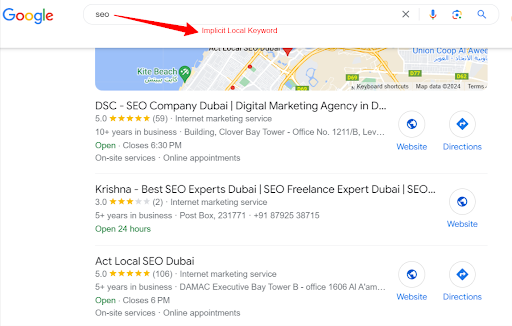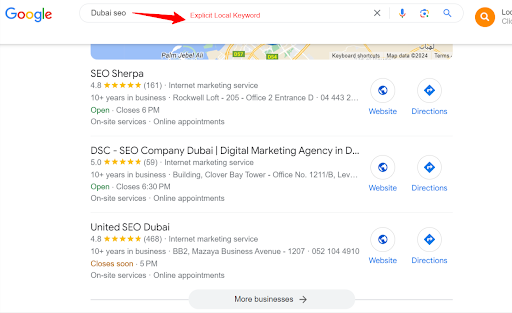10 Steps for Startup Founders to Build a Personal Brand on Social Media
Read MoreSearch Engine Optimization (SEO) is a crucial part of online marketing. We live in a world where everything is just a few clicks away. For businesses to grow in the 2020s, it is necessary for them to optimize their websites. And for local businesses, optimizing their websites for local search is the way to go. While the differences between optimizing your site for Local vs Global might be subtle, the results can vary drastically.
The focal point of local SEO starts with local keyword research. It is a vital component of local SEO, and it's the process of finding and analyzing phrases and words that people use when searching for businesses or services in a particular geographic location. We at Wisoft Solutions believe that local SEO can be a key difference maker in your business ranking no.1 and not ranking at all.
Which is why we have curated this guide. In this guide, we will explore the importance of local keyword research, what it is, why is it essential for local SEO, the differences between implicit and explicit keywords, and how to find the right local keywords for your business. Let’s dive in!
What is Local Keyword Research?
Starting with the basics, local keyword research is the process of finding and analyzing phrases and words that people use when searching for businesses or services in a particular region. At Wisoft Solutions, our focus is the MENA region and in particular, the city of Dubai, UAE.
Local keyword research involves researching keywords that are relevant to your business and your local market. We also help you understand your target audience better by deducing their habits. By learning habits and their search tendencies, your business will be able to put your products and services up-front. Local keyword research helps identify the keywords and phrases that are most likely to generate traffic to your website. Ultimately, the goal is to convert that traffic into paying customers.
Why is Local Keyword Research Essential for Local SEO?
Now, let’s understand why local keyword research is the pillar of local SEO. To understand this you must know that SEO is driven by what people look for and in each region, needs will vary. Hence, your business must strive to understand what your customers are looking for and that starts with local keyword research. It is essential for local SEO because it helps you understand how your target audience searches for products and services. This in turn helps you see what your competitors are doing. It will also reflect the state of the market.
By identifying the right keywords and phrases that your audience uses, you can optimize your website's content and metadata for these terms. This makes it easier for search engines to crawl and index your site. Local optimization can help you to achieve higher search engine rankings, which can lead to increased website traffic, more leads, and ultimately, more sales.
Differences between implicit and explicit local keywords


In keyword research, there are two main types: implicit and explicit. While both types of keywords serve basically the same purpose, which is to help search engines understand the content of a website and match it with relevant search queries, they differ in how they are expressed and interpreted. Confused, allow us to explain further.
In local searches, the intent of the search is localized, meaning they are looking for something specific near their geographical location. This local intent itself can be implicit or explicit. So how does one differentiate between local intent that is implicit or explicit?
| Implicit Local Keywords | Explicit Local Keywords |
|
Implicit searches do not specify a location, Instead, it is a simple search term For Example: Restaurants |
Explicit searches include a specific location For Example: Dallas Restaurant |
The good news is that Google’s algorithms are smart enough for it to not require SEO that clarifies between implicit and explicit. It already has location data and its algorithm understands the intent behind searches.
How do I find local search keywords?
To make things easier for you and to understand the process rather intricately, we have devised a four-step formula that will help you find local search keywords. These are just steps to help you out, for a more detailed usage contact Wisoft Solutions today.
- Research relevant keywords that are used locally
The first step in finding local search keywords is to research relevant keywords that are used in the area. You can use various tools to find the right keywords. These are tools such as Google AdWords Keyword Planner, Google Trends, and SEMrush. Start by brainstorming a list of keywords related to your business and location. This has to be specific to your business and location. By location, we do not mean your local area but rather your city. Google does not give you microscopic results.
- List out your solutions and keywords
Now that the research part is complete, it is time to bring in some order. Once you have a list of keywords, you can use keyword research tools to determine their search volume and competition level. Remember, you have to choose keywords that have high search volume and low competition. These keywords are likely to attract more local customers to your website and you won’t be competing with big businesses or the more popular ones in your area.
Here are some examples of local search keywords that you can use for your local SEO efforts:
- [your business/service] in [city]
- [city] [business/service]
- [business/service] near me
- Best [business/service] in [city]
- [business/service] [zip code]
- Cheap [business/service] in [city]
- [business/service] deals in [city]
- Keep an eye on how your competitors are ranking for the same keywords
Now, while you may have perfected your end of the deal, it is time to understand what your competitors are doing. You need to keep an eye on how your competitors are ranking for the same keywords. Analyze the websites and online presence of your biggest competitors to determine the keywords they are targeting. Tools like SEMrush, Ahrefs, and Moz can help you analyze your competitor's SEO strategy. This will help you identify any gaps in your own strategy and even help you find new keywords to target.
- Map the keywords to your URLs
You have your keywords, and you now know what your competitors are doing, it is time to map local keywords to your website URLs. Each page on your website should be optimized for a specific keyword or set of keywords. Make sure that your URLs, page titles, meta descriptions, and content include the target keywords. This will help search engines understand what your website is about and improve your chances of ranking higher in local search results. Ultimately, it will lead to more visits and eventually conversions.
Conclusion
We hope that this guide has helped you understand the importance of local keyword research a lot better. We at Wisoft Solutions believe that finding local search keywords is a crucial aspect of local SEO. By researching relevant keywords, analyzing your competitors, and optimizing your own site you can make breakthroughs. Following the guide and enlisting the help of experts who are proficient in SEO can help improve your chances of ranking higher in local search results and attract more customers to your business.






